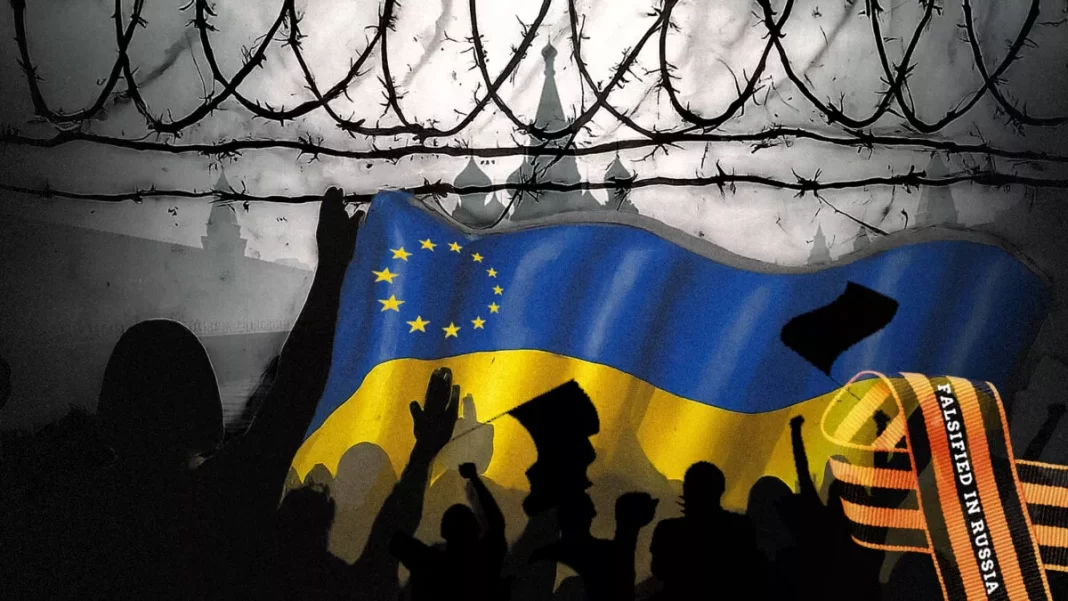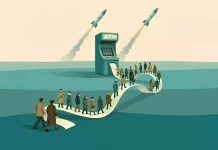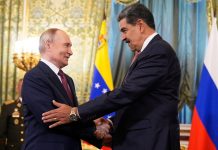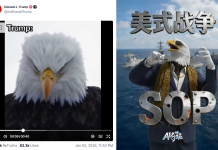By EUvsDisinfo
Many historians agree that school history textbooks shouldn’t cover current events – some historical distance is usually necessary to make sense of an era. But that rule clearly doesn’t apply to Russia’s new state-approved textbooks, curated and partially written by Putin’s aide Vladimir Medinsky. The new grade 11 textbook doesn’t just cover the events of the past 20 years, it includes an entire chapter on the war that’s still ongoing: Russia’s invasion of Ukraine.
The reason is simple. These books aren’t trying to analyse the past. The Kremlin has written them to revise history and serve the propaganda needs of the present. The chapter on the “special military operation” – the official euphemism for Russia’s war against Ukraine – is where all pro-Kremlin disinformation narratives enabling Russia’s war come together to complete the propaganda puzzle.
War as an act of peacekeeping
We’ve already exposed the myth of “peaceful Russia,” an allegedly morally superior country that never starts wars, unless it absolutely has to defend itself – or protect someone.
This time, the claim is pushed to the extreme. Pupils are told that Russia had to invade Ukraine to prevent nothing less than “the end of civilisation”. “We couldn’t allow that to happen,” the textbook redundantly insists.

To underscore Russian superiority on the battlefield, the chapter descends into hyperbolic disinformation, accusing the Ukrainian army of using its own citizens as “human shields.” “Such a barbaric tactic has never before been used by any army in the world on its own territory in all of history”, it claims. Then, with mock encouragement toward independent or critical thinking, it adds: “You are already adults, dear high school students! Draw your own conclusions about Ukraine’s ‘new military tactics.’”

The so-called history book relies on emotional appeals, conspiracy theories, and propagandistic language. Failing to see the irony, the authors urge students to “be vigilant” so they don’t “fall victim to cheap manipulation” by so-called “foreign agents”.
Create a hero/death cult
The chapter couldn’t be complete without a subsection celebrating “heroes of the war”. In it, Russian national identity is defined not through the country’s achievements, but through self-sacrifice on the battlefield. Russia, the Kremlin claims, is invincible because its citizens are willing to fight and die for it.
The list of “heroes” starts with Vladimir Zhoga, commander of the Sparta Battalion – a notorious Kremlin-loyal, separatist unit accused of multiple war crimes in Donbas. His placement is no coincidence: his father, Artyom Zhoga, has since launched a political career, handpicked by the Putin administration as a model veteran of the “special military operation”. Putin used Artyom Zhoga to “spontaneously” announce his intention to run for a fifth presidential term – a move that underscores just how central the war has become to Putin’s political identity and personal power.
The “betrayal of the West” narrative at the forefront
Blaming the West of betraying Russia is another central element of the pro-Kremlin disinformation narrative about Russia’s non-stop war with the West. The chapter on Russia’s war against Ukraine brings it into full force. The Kremlin claims that the West is fixated on the idea of “destabilising Russia from within” with the final goal being “the dismemberment of Russia and control over its resources”.
The accusation launched against the undefined ‘West’ goes: “The scenario of “containment” — in reality, the dismemberment of Russia — has already been rehearsed by NATO in the case of Yugoslavia. The centuries-old dream of the South Slavs for a common home was trampled,” the book states.
There’s a lot to unpack in these two sentences: the idea of NATO as a sinister force that seeks the destruction of Russia, the conflation of “containment” with “dismemberment”, the conspiratorial “in reality”, which suggests the West’s definitions cannot be trusted – and, perhaps most notably, shifting the blame for the collapse of Yugoslavia onto the West, accused here of “trampling” a Slavic dream.
Connect the imaginary dots…
From there, the authors attempt to connect the imaginary dots allegedly linking the war in Georgia, where a “pro-American regime” attacked Moscow-friendly South Ossetia, to the supposed “revival of Nazism” in the countries once occupied by the Soviet Union, especially Ukraine, and finally, to what the book calls a “bloody armed coup” in Ukraine in 2014.
You might struggle to see the connection, but the textbook makes it explicit: all these events were orchestrated by ‘the West’ with the aim to turn Russia into the next Yugoslavia.
…and always blame the West
Russia’s war against Ukraine is, therefore, framed as Russia’s war with the West — a message made even more explicit in the subheadings, where “Special Military Operation” is immediately followed by “Confrontation with the West.” This subsection claims the West “showered Ukraine with money and weapons” and imposed “illegal” sanctions on Russia with the sole aim of seizing its assets. The book grows especially emotional here, calling the sanctions an “unseen and unthinkable” act of thievery that “not even Napoleon could dream of.

And Ukraine?
Where, one would ask, is Ukraine in all of this? Well, in Putin’s world, Ukraine never really existed in the first place – and the books try extremely hard to drill this message into students’ minds.
Little Anti-Russians
“I consider Russians and Ukrainians to be one people. In this sense, the whole of Ukraine is ours,” Putin proclaimed recently. In July 2021, he even professed to have penned an entire essay, On the Historical Unity of Russians and Ukrainians, to promote this view – arguing that Ukrainians and Belarusians, along with Russians, are part of the triune Russian nation. Notably, both of the “brotherly” nations are assigned subordinate roles in this unity, with Ukrainians quite literally labeled “Little Russians”.
The is a classic etno-imperialist trick: simply claim ownership or supremacy of the group of people you want to dominate.
In Medinsky’s revisionary history textbooks, the “artificiality” of the Ukrainian state is a recurring theme. The 10th grade book features an insert on Ukraine’s autonomy movement during the 1917 Revolution, which describes Ukrainian leaders as radical separatists and highlights that there was a lack of any “fixed consensus” on Ukraine’s territorial boundaries at the time. In the 11th grade book, an entire chapter explains how former Soviet leader Khrushchev “gifted” Crimea to Ukraine, reinforcing the idea that the peninsula never truly belonged to it in the first place.
The chapter on “special military operation” takes this even further, portraying Ukraine as both an ultra-nationalist “Anti-Russia” and a puppet state devoid of real agency. Ukrainian nationalism itself, the Kremlin claims, was artificially created as a geopolitical weapon, with Austrian accused of intelligence operations allegedly sponsoring “Anti-Moscow sentiments” among “the neighboring Little Russians, citizens of the Russian Empire.”
The textbook insists that without this malign influence, Slavic nations in Russia’s orbit would have naturally gravitated toward Moscow.

Textbooks as “a weapon in the information war”
In a teaser to a recent interview with Vladimir Medinsky and his co-author, Anatoly Torkunov, Russian TV presenter Marina Kim calls the new textbooks for grades 10-11 “our main weapon in the information war”. “Winning the fight for our history is a strategic and complicated task, and the demand for victory is urgent,” she proclaims, openly admitting that the main goal of these books is to be used as instruments of ideological combat.
The urgency that she refers to comes from the fact that Russia is waging a war, and these textbooks are part of the same campaign — not on the battlefield, but in the classroom. The chapter on the “special military operation” is more than just a late addition: it’s the culmination of twenty years of narrative-building under Putin. Here, all the familiar propaganda themes converge in a national myth repackaged for a wartime generation. In this new patriotic canon, the invasion of Ukraine isn’t an aberration — it’s the inevitable endpoint of Russian destiny.
By EUvsDisinfo





